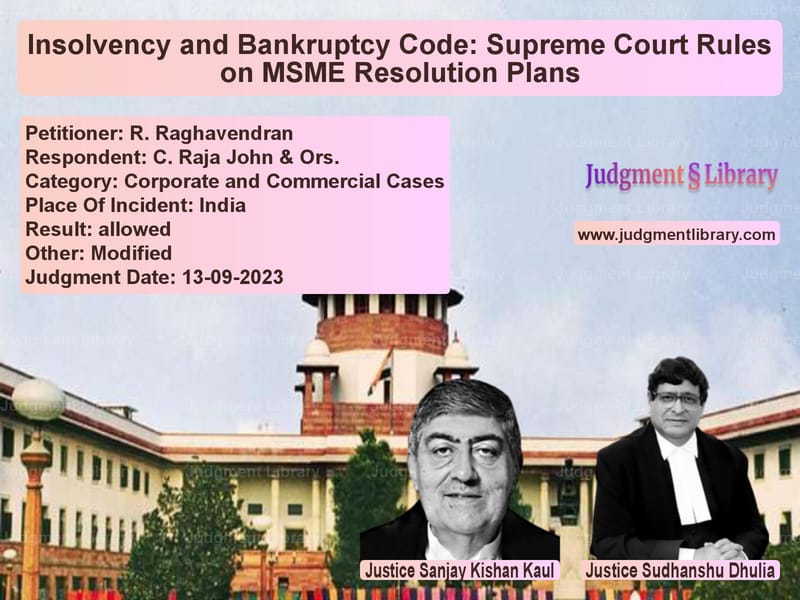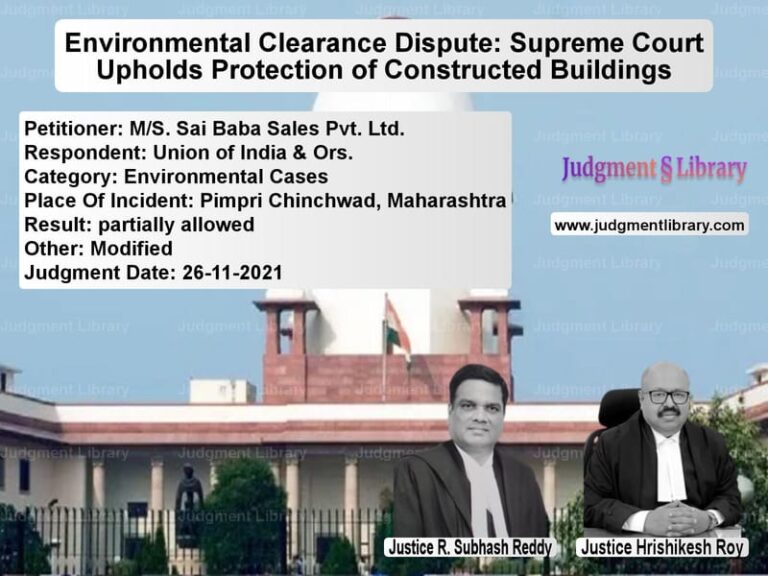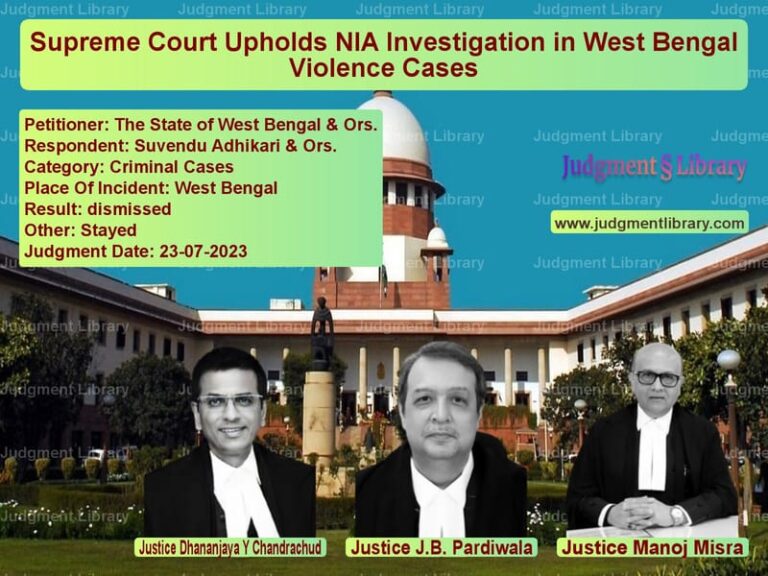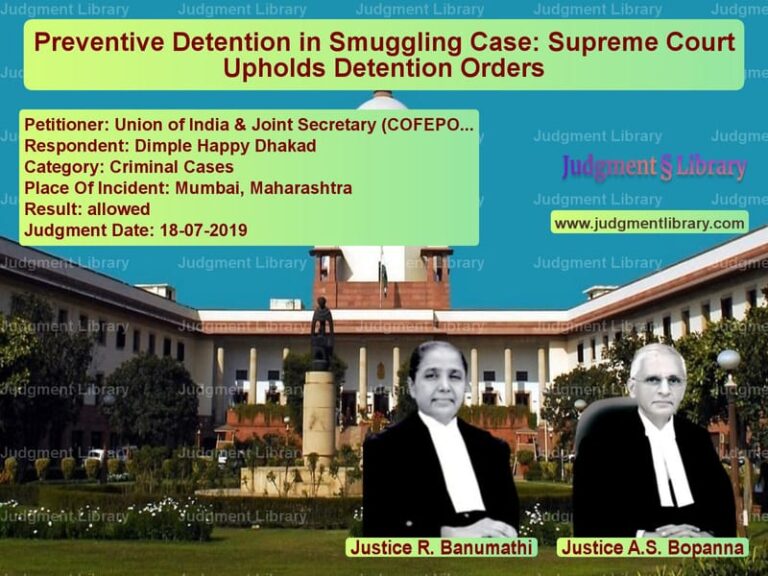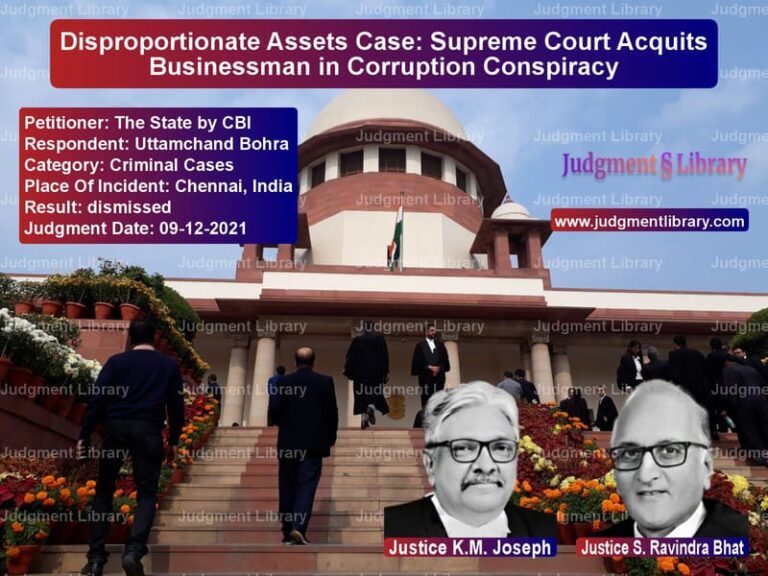Insolvency and Bankruptcy Code: Supreme Court Rules on MSME Resolution Plans
The Supreme Court in R. Raghavendran vs. C. Raja John & Ors. addressed a critical issue under the Insolvency and Bankruptcy Code, 2016 (IBC), particularly regarding the eligibility of Micro, Small, and Medium Enterprises (MSMEs) to regain control of their businesses during insolvency resolution. The case revolved around whether an MSME’s promoter could submit a resolution plan without competing with other applicants.
Background of the Case
The appeal arose from a dispute concerning the insolvency proceedings of Springfield Shelters Pvt. Ltd., an MSME. The company entered into insolvency on February 12, 2020, and the appellant, R. Raghavendran, was appointed as the Resolution Professional (RP).
The National Company Law Appellate Tribunal (NCLAT) had ruled that MSME promoters were not required to compete with other resolution applicants for regaining control of the corporate debtor. However, the appellant challenged this finding, leading to an appeal before the Supreme Court.
Legal Issues Raised
The Supreme Court had to decide:
- Whether the exemption granted to MSME promoters from Section 29A of the IBC allowed them to bypass the competitive bidding process.
- Whether the observations made by the NCLAT in paragraphs 32 and 34 of its judgment were legally sustainable.
- Whether the Resolution Professional was justified in seeking competing bids despite the NCLAT ruling.
Petitioner’s Arguments (R. Raghavendran, Resolution Professional)
The Resolution Professional argued:
- The NCLAT’s order improperly exempted MSMEs from the competitive bidding process.
- The order contradicted the principle of maximization of value of assets, a core objective of the IBC.
- Calling for multiple resolution plans was essential to ensure transparency and prevent undue favor to the erstwhile promoters.
- The interpretation of the NCLAT was inconsistent with the earlier decision in Bafna Pharmaceuticals Ltd., which had been upheld by the Supreme Court.
Respondent’s Arguments (C. Raja John & Ors.)
The respondents, representing the MSME’s promoters, contended:
- As the corporate debtor was an MSME, the exemption from Section 29A(c) and (h) of the IBC applied.
- Under the IBC framework, promoters of MSMEs should be allowed to submit a resolution plan without competing with third parties.
- The NCLAT’s order was justified in light of the legislative intent to protect MSMEs and ensure their revival.
- The process followed by the Resolution Professional, including inviting competing bids, violated the NCLAT’s ruling.
Supreme Court’s Ruling
The Supreme Court set aside certain observations made by the NCLAT and clarified the legal principles governing MSMEs under the IBC.
1. MSME Promoters Are Exempt from Certain Restrictions
- The Court acknowledged that MSMEs were exempt from ineligibility under Section 29A(c) and (h) of the IBC.
- This exemption allows MSME promoters to submit a resolution plan even if they were classified as a non-performing asset (NPA).
2. Competitive Bidding Process Must Be Followed
- The Court clarified that merely being an MSME does not mean that promoters can bypass the resolution process.
- The Committee of Creditors (CoC) has the discretion to invite competing resolution plans if it deems necessary.
- The fundamental goal of the IBC is to maximize asset value, and restricting bids to only the existing promoters could lead to lower realization for creditors.
3. NCLAT’s Observations Were Incorrect
- The Supreme Court ruled that the NCLAT’s observations in paragraphs 32 and 34 were legally unsound.
- The IBC does not grant MSMEs an absolute right to regain control of their company without competing with others.
- The Resolution Professional was justified in inviting multiple bids.
4. Two-Month Window for Settlement
- The Court granted the respondents a two-month window to settle their dues with financial creditors through a One-Time Settlement (OTS).
- If the settlement failed, the CoC was free to proceed with the resolution process, including considering competing plans.
Final Judgment
The Supreme Court:
- Set aside paragraphs 32 and 34 of the NCLAT order.
- Allowed the appeal, ruling that MSMEs are not automatically entitled to regain control without following due process.
- Granted the respondent a two-month window to negotiate an OTS.
- Directed that, if the settlement failed, the CoC could proceed with resolution proceedings.
Impact of the Judgment
This ruling has significant implications:
- Ensures fair competition: The judgment reaffirms that MSMEs cannot bypass the resolution process without scrutiny.
- Clarifies IBC framework for MSMEs: The ruling prevents any misinterpretation of the exemption under Section 29A.
- Preserves creditor rights: The judgment ensures that financial creditors can maximize their recovery through competitive bidding.
Conclusion
The Supreme Court’s ruling in R. Raghavendran vs. C. Raja John & Ors. establishes a crucial precedent in insolvency proceedings involving MSMEs. The decision ensures that while MSMEs receive statutory exemptions, they must still adhere to the principles of transparency and asset maximization under the IBC. The Court’s decision balances the revival of MSMEs with the rights of creditors, ensuring that insolvency resolution remains a fair and competitive process.
Petitioner Name: R. Raghavendran.Respondent Name: C. Raja John & Ors..Judgment By: Justice Sanjay Kishan Kaul, Justice Sudhanshu Dhulia.Place Of Incident: India.Judgment Date: 13-09-2023.
Don’t miss out on the full details! Download the complete judgment in PDF format below and gain valuable insights instantly!
Download Judgment: r.-raghavendran-vs-c.-raja-john-&-ors.-supreme-court-of-india-judgment-dated-13-09-2023.pdf
Directly Download Judgment: Directly download this Judgment
See all petitions in Bankruptcy and Insolvency
See all petitions in Corporate Compliance
See all petitions in Company Law
See all petitions in unfair trade practices
See all petitions in Judgment by Sanjay Kishan Kaul
See all petitions in Judgment by Sudhanshu Dhulia
See all petitions in allowed
See all petitions in Modified
See all petitions in supreme court of India judgments September 2023
See all petitions in 2023 judgments
See all posts in Corporate and Commercial Cases Category
See all allowed petitions in Corporate and Commercial Cases Category
See all Dismissed petitions in Corporate and Commercial Cases Category
See all partially allowed petitions in Corporate and Commercial Cases Category

